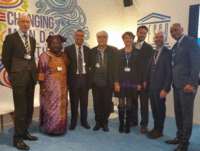“Climate change: What is the impact for Africa?”
Organization of the 2nd edition of the round table at the COP 23
There is no doubt that the African continent will be the continent most and hardest affected by the adverse impacts of climate change. The multiple and devastating effects of climate change may have many impacts on vulnerable populations on the African continent, such as by leading to the following potential risks: increased natural disasters, rainfall and drought problems, desertification, increased problems of water sanitation, energy access issues, food insecurity increased erosion due to excessive salinization of soils and increased impact on biosphere reserves. Awareness and information on the fight for climate preservation have become a major issue for the continent and its population.
Within this context, the Africa Department and its Contextual Analysis and Foresight Unit (AFR/CAF) organized the second edition of the round table “Climate change: What is the impact for Africa?” at the margins of COP 23, held in Bonn, Germany. In line with the flagship program 4 of the Operational Strategy for Priority Africa ("Fostering science for the sustainable management of Africa's natural resources and disaster risk reduction"), the round table provided testimonials and recommendations from international scientist panelists, representing various stakeholders (NGOs, academia, the private sector and the United Nations system)
________________________________________________________________
Topics covered
1. Climate change and the gender issue in Africa (Christine Bruneau);
2. Impact of climate change for African island states (Nigel Thomas Crawhall);
3. The scarcity of water and its sanitation in Africa (Jean-Paul Augereau);
4. The impact of climate change on ecosystems and biosphere reserves (Hassane Belguenani);
5. Climate change and energy in Africa: towards an eco-responsible energy for the continent and the reduction of greenhouse gas emissions by limiting the use of firewood (Salamata Gakou);
6. Climate change and desertification in Africa: the Great Green Wall (Gilles Boëtsch);
7. The issues and impacts of COP 23 for the African continent (Simon Chin-Yee).
________________________________________________________________
Panellists
The multiparty round table gathered the following high-level panelists:
Salamata GAKOU
President of the African Network of Women Scientists and Engineers (RAFESI) and the Association of Women Scientists and Engineers of Mali (AFIMA), Former Minister of Housing, Land Affairs and Urban Planning of Mali
________________________________________________________________
Christine BRUNEAU,
President of the NGO Femmes de Demain
________________________________________________________________
Hassane BELGUENANI
Senior Programme Specialist, Natural Sciences Sector, Climate Change Focal Point, UNESCO Office for Morocco, Algeria, Mauritania and Tunisia in Rabat (FU/RAB), UNESCO ________________________________________________________________
Nigel Thomas CRAWHALL
Head of the Small Islands and Indigenous Knowledge Section, Division of Science Policy and Capacity-Building, Natural Sciences Sector (SC/PCB/SII), UNESCO
________________________________________________________________
Jean-Paul AUGEREAU
Founding member of Safe Water Cube
________________________________________________________________
Gilles BOËTSCH
Emeritus Research Director, CNRS
________________________________________________________________
Simon CHIN-YEE
PhD Researcher, King’s College of London
________________________________________________________________
Adoulaye IBRAHIM,
Programme Specialist, Focal point for Sciences, Head of the Contextual Analysis and Foresight Unit, Africa Department (AFR/CAF), UNESCO
Roundtable Organizer and Moderator
________________________________________________________________
Results achieved
Providing a platform for exchange and sharing of good practices between high-level international scientists was one of the major expected results of the round table, which has been reached. The panelists developed a set of recommendations and proposed initiatives and measures to mitigate and adapt to the impacts caused by climate change in Africa. Intended to be consolidated within a report, these recommendations will be brought to the attention of the UNESCO Task Force on Climate Change. Finally, the event allowed the information and sensitization of COP 23 audience on the climate change impacts in Africa.

From left to right: Peter Dogse (SC/EES/ESP, UNESCO), Salamata Gakou (RAFESI, AFIMA, Former Minister of Mali), Hassane Belguenani (FU/RAB, UNESCO), Gilles Boëtsch (CNRS), Christine Bruneau (Femmes de Demain), Simon Chin-Yee (King’s College of London), Nigel T. Crawhall (SC/PCB/SII, UNESCO) and Abdoulaye Ibrahim (AFR/CAF, UNESCO).
- Click here for the photo Galery
- Click here for the video of the event
- Click here for the video of Safe Water Cube











